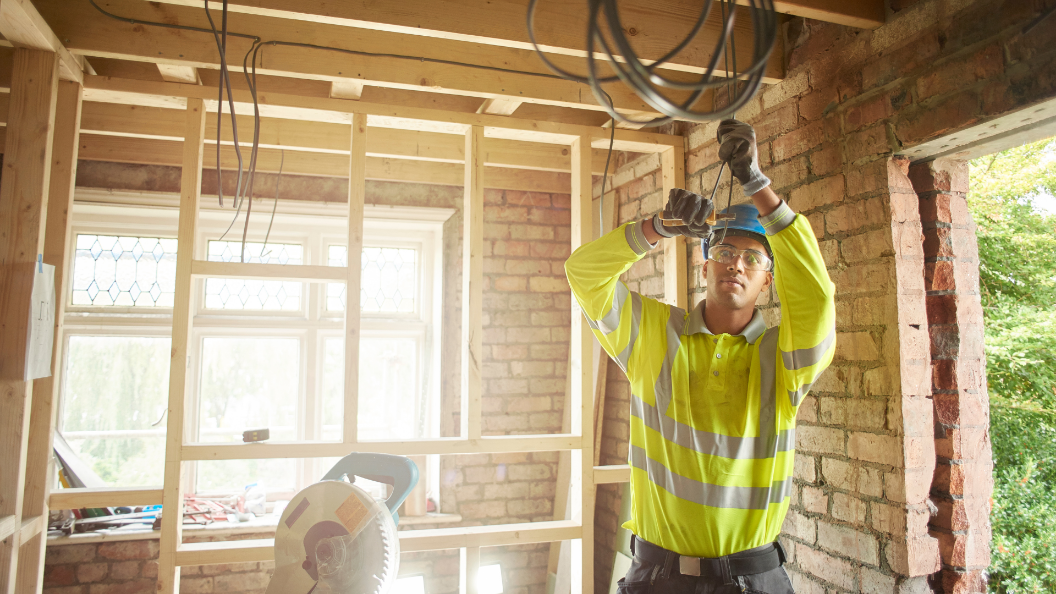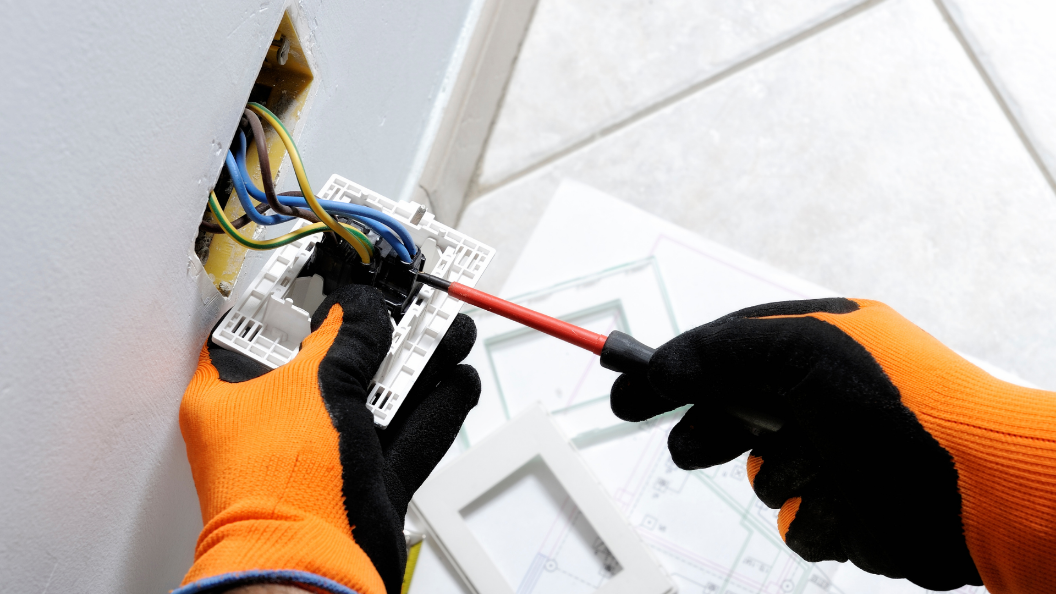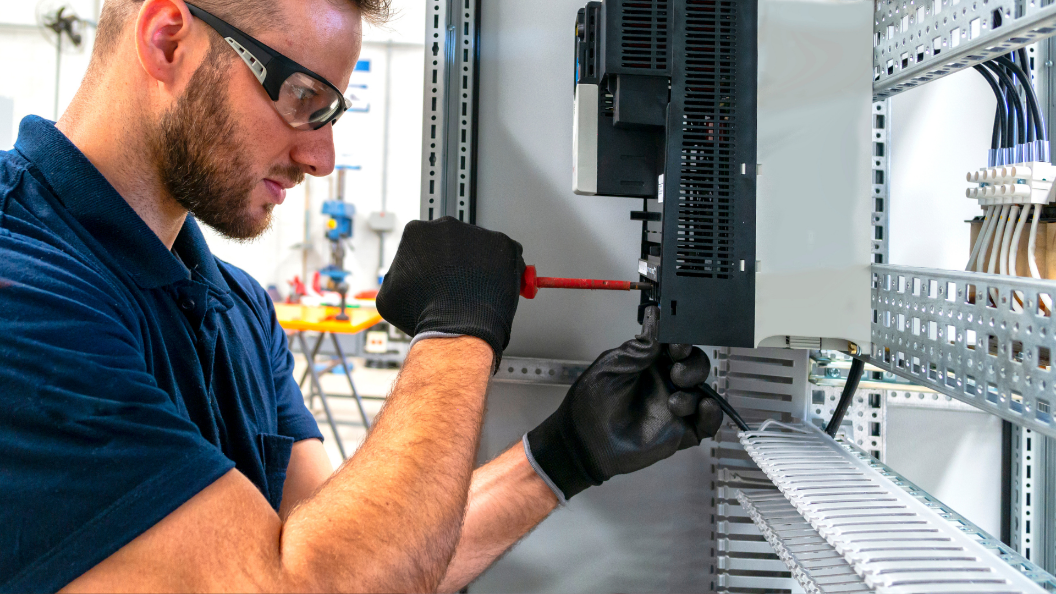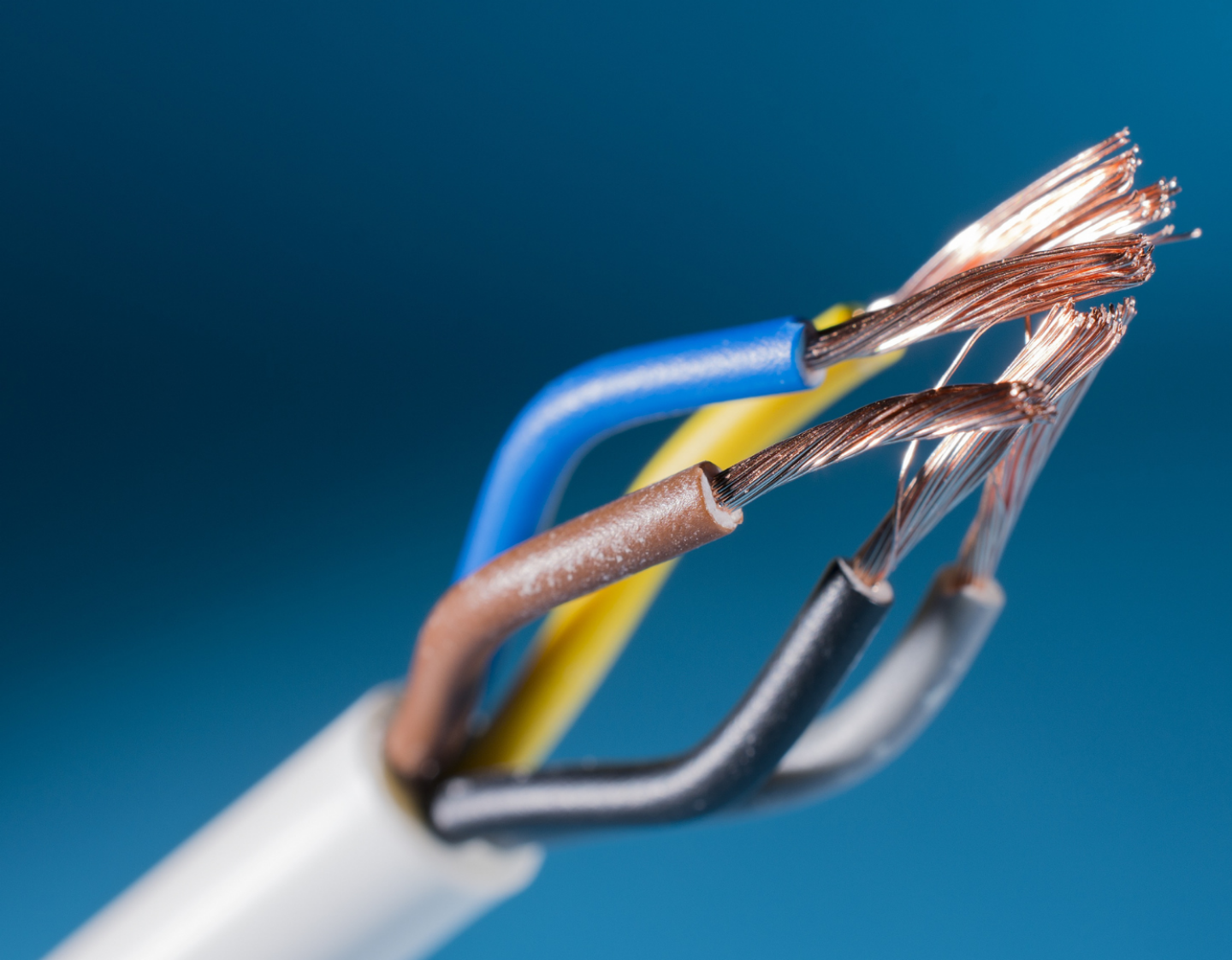Working as an electrician offers a stable and rewarding career path with plenty of opportunities for growth and development. Whether you're just starting out, considering a career change, or an experienced electrician looking for your next opportunity, this guide provides everything you need to know about the electrical trade in the UK.

Types of Electrical Work
The electrical trade encompasses a wide range of specialisations, making it a diverse career with multiple paths to explore:
Residential electricians focus on homes and apartments, installing and maintaining wiring, lighting, and electrical systems that keep daily life running smoothly. With a large number of homes constantly needing electrical services, this area offers steady work and the potential to build a loyal client base.
Commercial electricians work in office buildings, shops, and other business settings. These projects often involve larger scale work and more complex systems such as data cabling and building management systems. Commercial buildings have extensive electrical demands, creating significant opportunities for electricians with the right expertise.
Industrial electricians operate in factories, power plants, and other industrial sites. They focus on maintaining and repairing the complex electrical systems that power industrial machinery and keeping production running smoothly. This work often involves high-voltage systems and requires specialised knowledge of safety protocols.
Beyond these core areas, the electrical trade offers numerous opportunities for specialisation. The renewable energy sector is growing rapidly, with high demand for electricians who can install and maintain solar panels, wind turbines, and electric vehicle charging points. Other specialist areas include security systems, building automation, and highway electrical systems such as street lighting.
Daily Life as an Electrician
A typical day for an electrician starts early, usually around 7:30 am, when you'll review your jobs for the day. You might be completing a residential rewire, installing new circuits in a commercial building, or diagnosing faults in an industrial setting.
Common tasks include installing electrical wiring and systems, maintaining and repairing existing wiring, reading and interpreting blueprints, connecting electrical components, and testing circuits to verify they work properly and meet safety standards.
The work is physically active and mentally engaging, requiring you to solve problems while following strict safety protocols. You'll use various tools from basic screwdrivers and pliers to sophisticated testing equipment that helps identify electrical issues.
Safety is paramount in electrical work. You'll need to use appropriate protective equipment, follow lockout procedures to make sure circuits are de-energised before work begins, and use insulated tools designed for electrical work. The physical demands include lifting materials, crouching, kneeling, and sometimes working in confined spaces.
Skills and Qualifications
The traditional apprenticeship route remains highly valued and effective. Apprenticeships are open to anyone over 16 and typically take about four years to complete. They offer a blend of on-the-job training and classroom learning, allowing you to earn while you learn. There are two main apprenticeship options: Installation & Maintenance Electrician, which covers a broad range of electrical work, and Domestic Electrician, which focuses on residential properties.
Alternative paths include college courses leading to Level 2 and Level 3 Diplomas in Electrical Installation, T Levels in Building Services Engineering, and Experienced Worker Assessments for those who already have significant relevant experience.
Becoming a qualified electrician in the UK requires both technical knowledge and practical training. The Achievement Measurement 2 (AM2) assessment is a key requirement for demonstrating practical competence, while the 18th Edition Wiring Regulations sets the current standards for all UK electricians.
Successful electricians need strong technical skills, including understanding of electrical theory, knowledge of wiring regulations, proficiency in various installation techniques, and ability to read blueprints and use testing equipment. Equally important are problem-solving abilities, attention to detail, good communication skills, and physical dexterity for working with small components.

Career Development
The electrical trade offers clear pathways for advancement as your experience grows. Many electricians start as apprentices before becoming fully qualified. With experience, you might move into supervisory roles, site management, or project management positions.
Specialising in high-demand fields such as renewable energy technologies can lead to enhanced earning potential. Other popular specialisations include becoming a certified electrical inspector and tester, focusing on smart home technologies, or working with industrial automation systems.
For those looking to advance their careers, pursuing higher-level qualifications such as HNDs or degrees in electrical engineering can open doors to more specialised roles. Experienced electricians with leadership qualities may find opportunities in management positions, overseeing teams and coordinating projects.
Many qualified electricians choose to establish their own businesses, offering services ranging from domestic wiring to specialised industrial work. Self-employment provides flexibility to set your own hours and rates, but success depends on building a strong reputation and client base. It's also important to secure necessary insurance coverage, including public liability and professional indemnity insurance.
Salary and Job Outlook
For qualified electricians, average salaries generally fall between £30,000 and £40,000 per year. Factors affecting pay include experience level, geographical location, specialisation, qualifications, and type of employment. Self-employed electricians may earn more than those directly employed, depending on their business skills and workload.
The UK is currently facing a significant skills gap in the electrical trade, with projections suggesting a need for as many as 104,000 additional electricians by 2032. This shortage is due to an ageing workforce, lack of new entrants, and the growth of green technologies requiring specialised expertise.
Looking ahead, the future for electricians in the UK appears bright, with continued growth in demand anticipated. The UK's commitment to achieving net-zero carbon emissions is fuelling demand for electricians with skills in renewable energy solutions. Government initiatives promoting green infrastructure further amplify this need, making the outlook particularly strong for those willing to embrace new technologies.
Getting Started
To begin a career as an electrician, first assess your interest and aptitude for technical concepts and practical work. Research the different routes available, then gain the necessary qualifications, starting with a Level 2 qualification in electrical installation and progressing to Level 3. Obtaining the 18th Edition Wiring Regulations qualification and completing the AM2 assessment demonstrates practical competency.
Finding an apprenticeship often requires proactive effort. Search through the Gov.uk "Find an apprenticeship" service, contact local electrical companies directly, and explore opportunities through colleges with industry connections. When applying, highlight your enthusiasm, willingness to learn, and any relevant skills or experience.
For those seeking training outside apprenticeships, many further education colleges and private providers offer electrical installation courses leading to recognised qualifications. Options include comprehensive courses for beginners, specialised courses in areas like domestic installation, and flexible online options.
Understanding required professional cards and certifications is crucial. The Electrotechnical Certification Scheme (ECS) card is the primary identification and competence card for the UK electrical industry, proving qualification status and health and safety awareness. To obtain an ECS card, you'll need evidence of relevant qualifications and must pass the ECS Health, Safety & Environmental Assessment.

Working with Recruitment Agencies
Partnering with a recruitment agency can offer significant benefits for electricians at all career stages. As specialists in the electrical trade, the Select team have industry-specific knowledge, access to exclusive job openings, and can streamline your job search process.
Types of contracts we can offer include permanent positions, fixed-term contracts for specific projects, temporary roles for immediate staffing needs, freelance opportunities, and temporary-to-permanent arrangements that can lead to long-term employment.
As an agency we can help advance your career by connecting you with roles matching your skills, providing access to training opportunities, offering insights into industry trends, and identifying positions with clear advancement pathways. For experienced electricians, we can source senior-level positions that may not be widely advertised.
Your Future as an Electrician
A career as an electrician offers job security, diverse work environments, clear progression pathways, good earning potential, and the satisfaction of providing an essential service. With the positive job outlook, growing demand for skills (especially in renewable energy), and various entry routes available, now is an excellent time to consider this profession.
If you're considering a career as an electrician or seeking your next opportunity in the electrical sector, reach out to us at Select Recruitment. Our team of experienced recruitment consultants understands the electrical industry and can provide personalised guidance to connect you with suitable opportunities across the UK.


